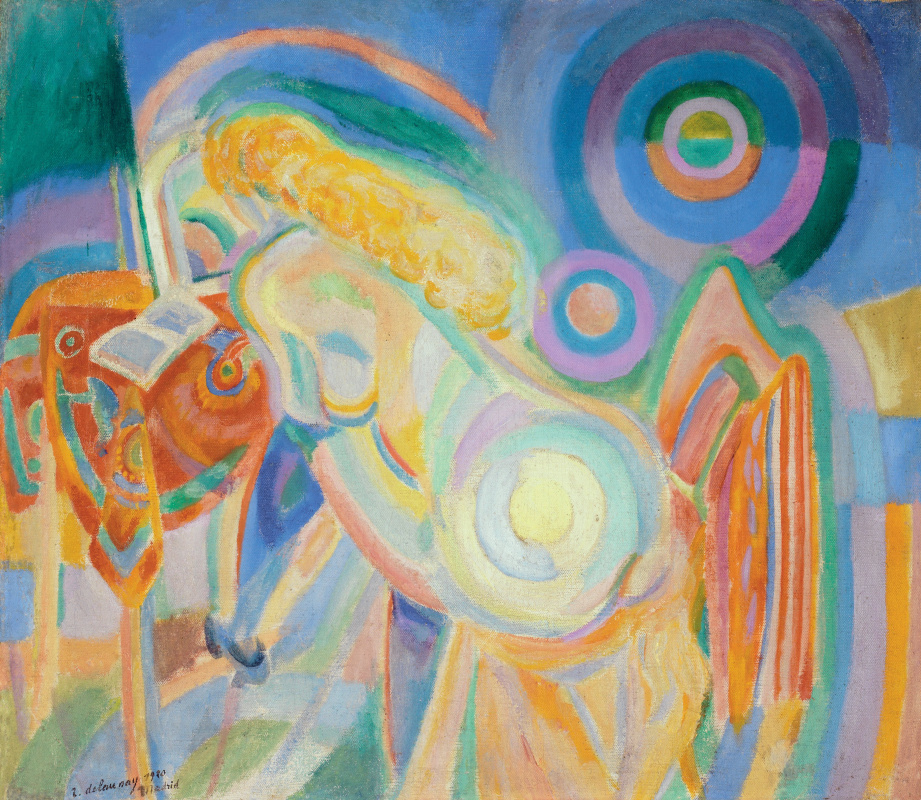log in
Enter site
Login to use Arthive functionality to the maximum
Orphism
59 artworks, 6 artists
Orphism (fr. orphisme, from fr. Orphee — “Orpheus”) is a direction of abstract painting, a branch of French post-impressionism with the play of colour and light on canvas. In the works by the “followers of Orpheus”, there are elements of cubism, futurism and expressionism. These artists abandoned the subject, form, and objectivity to create a cult of Colour. The new style gave the art bright, full of energy “solar paintings”.
The French cubist Robert Delaunay invented Orphism, and the poet Guillaume Apollinaire named the new direction in 1912. The movement developed till 1916, and it influenced the formation of subjectless art in Russia. Spouse artists Robert and Sonia Delaunay made friends and fellow thinkers with Mikhail Larionov and Natalia Goncharova, which became the beginning of rayonism.
Concentric circles and discs of bright contrasting colours, which create a sense of movement and musical rhythm in the viewer, have become a distinctive feature of Orphist paintings. The subjects also include portraits, landscapes, still lifes, interior paintings, but these are rather exceptions to the rule. Orphism is objectless painting, where solely the form and subject form the background. The artist splits the object into geometric shapes, arches, rainbows, and then randomly combines elements into amazing colour designs on the canvas. At the same time, the painter fills colours with symbolism. Bright colours, colour transitions, a rich palette create a sense of emotional and physical dynamics. The pictorial canvas “pulsates” following a musical rhythm. Such painting resembles an expanse of water, on which the artist creates impressionist colour storms with expressionist strokes.
Orphist paintings:
“Nude Woman Reading” 1915, “Portuguese Still Life” 1916, “Endless Rhythm” 1934 by Robert Delaunay; “Market at Minho” 1915, “Flamenco Singer” by 1916 Sonia Delaunay; “Flower” 1925 “Mechanism” 1928 by František Kupka.
Orphist artists:
Robert Delaunay, Sonya Delaunay, František Kupka, Fernand Leger, Francis Picabia, Aristarkh Lentulov, Wladimir Baranoff-Rossine, Morgan Russell.
The French cubist Robert Delaunay invented Orphism, and the poet Guillaume Apollinaire named the new direction in 1912. The movement developed till 1916, and it influenced the formation of subjectless art in Russia. Spouse artists Robert and Sonia Delaunay made friends and fellow thinkers with Mikhail Larionov and Natalia Goncharova, which became the beginning of rayonism.
Concentric circles and discs of bright contrasting colours, which create a sense of movement and musical rhythm in the viewer, have become a distinctive feature of Orphist paintings. The subjects also include portraits, landscapes, still lifes, interior paintings, but these are rather exceptions to the rule. Orphism is objectless painting, where solely the form and subject form the background. The artist splits the object into geometric shapes, arches, rainbows, and then randomly combines elements into amazing colour designs on the canvas. At the same time, the painter fills colours with symbolism. Bright colours, colour transitions, a rich palette create a sense of emotional and physical dynamics. The pictorial canvas “pulsates” following a musical rhythm. Such painting resembles an expanse of water, on which the artist creates impressionist colour storms with expressionist strokes.
Orphist paintings:
“Nude Woman Reading” 1915, “Portuguese Still Life” 1916, “Endless Rhythm” 1934 by Robert Delaunay; “Market at Minho” 1915, “Flamenco Singer” by 1916 Sonia Delaunay; “Flower” 1925 “Mechanism” 1928 by František Kupka.
Orphist artists:
Robert Delaunay, Sonya Delaunay, František Kupka, Fernand Leger, Francis Picabia, Aristarkh Lentulov, Wladimir Baranoff-Rossine, Morgan Russell.
Read more
Feed

